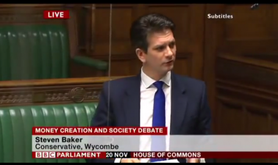
Brexit minister Steve Baker. Image: BBC, fair use.
As I crawled through our new Brexit minister’s asbestos-lined maze of corporate lobby links, something became more obvious than ever. Most of the liberal commentary on Britain’s negotiations to leave the EU has fallen for the first lie of nationalism: that there is such a thing as a coherent national interest.
While the right wing press waves its union flags as it cheers ‘our’ negotiating team, left and liberal commentators have largely lined up to sneer at how incompetent and underprepared Britain’s government is for such a complex process. But, while it’s largely true that David Davis and his junior ministers seem not to have much idea what they are doing, it’s not their incompetence that we should be worrying about.
In a couple of days of trudging through the new junior Brexit minister Steve Baker’s register of interests, his Companies House account, and his many hundreds of public statements, Peter Geoghegan and I were able to find countless examples of his willingness to repeat the lines of powerful interest groups. He took thousands of pounds from an arms company and served as vice-chair of the all party parliamentary group on aerospace, promoting the arms industry in parliament. He articulated the arguments of extreme fossil fuel firms, the asbestos lobby, the vaping industry, even the oil-rich dictatorship of Equatorial Guinea.
Other than the outrageous fact that it’s perfectly legal and not even particularly unusual for an MP to take thousands of pounds from a company, then promote their industry in parliament, the revelations tell us something really important about the web of power interests around the Brexiteers.
And, for me, this emphasises the real risk of Brexit. It reaffirmed what amounts to (along with Northern Ireland) the biggest worry of this whole affair, which isn’t about some abstract question of what’s ‘best’ for the country as a whole. After all, what do workers manufacturing cars in Sunderland have in common with those manufacturing credit default swaps in the City? Do the crofters of Sutherland really share much of an interest with the Duke of Sutherland? Do Tory voters in David Davis' seat have the same worries about Brexit as Sinn Fein supporters in Derry?
Whilst, of course, some things will impact on everyone who lives within the British and Irish Isles to some extent, the troubling questions aren’t really the ones about things which effect all of us. The worrying issues are the majority, where both sides in the negotiations will have to choose what – and who – to prioritise.
In her now legendary book “The Shock Doctrine”, Naomi Klein details how, for decades, neoliberals have used crises to force through their radical, pro-corporate agenda. It’s not through the slow mechanics of normal democratic processes that the great privatisations and deregulations have taken place. Rather, big business tends to grab everything at precisely the moments that it’s all up in the air. From the plundering of Russia in the wake of the collapse of the USSR to the privatisation of beaches after the 2004 tsunami in south east Asia to the attacks on public housing, schools and hospitals in New Orleans in the wake of hurricane Katrina, the corporate agenda has marched on the back of crisis after crisis the world over.
The only thing that’s different about Brexit is that the crisis wasn’t a natural disaster or the final collapse of a dying regime. It was actively created by the same groups as have promoted shock therapy before, as an opportunity to force through the interests of the rich and powerful. Whatever the various possibilities for ‘Lexit’ might have been with a theoretical different government, the people who led the campaign to deliver a Leave vote saw it as an opportunity to remove Britain’s ‘red tape’ protections against corporate abuse, to turn the country into a playground for the rich and powerful, and to undermine the global action on climate change which the EU has played a key role in, and which represents an existential threat to much of the fossil fuel industry.
And the people in the room, negotiating what our future relationship with the EU – and our future trade deals with the rest of the world – will look like, were at the forefront of that movement. They are exactly the same people whose networks of friends and backers include the 'think tanks' with unknown funding sources, who argue against any kind of law which restricts profit, and who think that freedom means only the freedom to extract wealth from workers and the planet.
The threat of Brexit is not that Davis and his team are incompetent, nor that Liam Fox’s attempts at trade deals fail. The worry is that they might just turn out to be competent enough to achieve some of what they set out to achieve. They may just deliver a small percentage of the Brexit they envisaged, which could mean American agribusiness sweeping away England’s hedgerows and pumping our beef full of hormones. It could mean US health firms winning the right to bid for NHS contracts. It would mean the dismantling of rights at work and giving corporations the right to sue Britain for any laws which impinge on their profits. In the shadows around the negotiating room, who knows what the tobacco lobby, the asbestos lobby (which, it turns out, is still a thing), and a whole range of other corporate groups we’ve barely yet heard of will be pushing for?
And as it becomes clearer and clearer that large portions of the City backed Brexit as a way to free themselves from pesky European regulations, who knows what Davis and co will give them as they untie Britain from the EU’s web of rules and laws?
The worry in the Brexit negotiations isn’t that the EU officials walk over the British government. It’s that both sides succeed in doing what they do best: putting the interests of the rich and powerful ahead of the concerns of ordinary people across Britain, and Europe, and the world. And the problem with the way it’s being covered is that it makes it harder for us to mobilise against this onslaught on ordinary people.
We shouldn’t be mocking Davis, Fox and co. We should be mobilising to defend our holiday pay, our clean air and water, our health service, our countryside and wildlife, and everything else that they will auction off to the highest bidder before you can write another joke about how they didn’t have their meeting papers properly indexed.
Read more
Get our weekly email




Comments
We encourage anyone to comment, please consult the oD commenting guidelines if you have any questions.